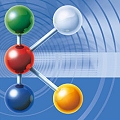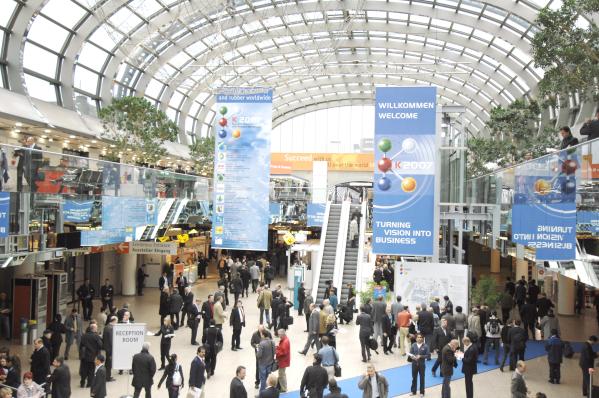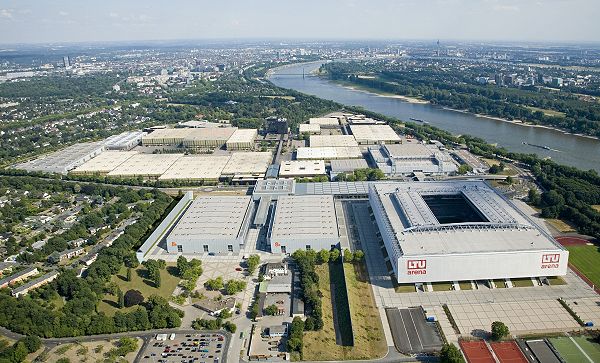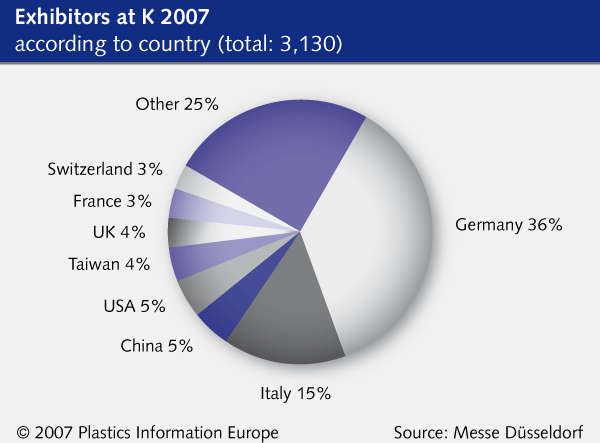K 2007
Record attendance at world's leading plastics trade show in Düsseldorf / Exhibitor numbers pass 3,100 for first time / China third largest participant / Focus on energy efficiency and sustainability
 |
Düsseldorf / Germany was the virtual capital of the polymer world during the eight days of K 2007, that ended on 31 October. Attendance at the world’s largest plastics trade exhibition was expected to break all records. Reflecting the still buoyant manufacturing economy, the number of exhibitors exceeded 3,100 for the first time, and the expanded exhibition space – including the newly built Hall 8b, complementing Hall 8a built for the 2004 event – was completely booked.
According to the organiser, Messe Düsseldorf, a total of 3,130 companies set up shop on 168,993 m² of space, compared with 2,904 on 160,475 m² at K 2004. More than a third of the exhibitors were from Germany, due as usual both to the “home match” and to the country’s especially strong position in the machinery segment. Non-German exhibitors totalled 1,992 on 95,532 m², up from 1,821 on 89,306 m² three years earlier. Italy, another machinery giant, was the second largest exhibitors. With 466 companies participating, it also supplied the largest foreign contingent.
According to the organiser, Messe Düsseldorf, a total of 3,130 companies set up shop on 168,993 m² of space, compared with 2,904 on 160,475 m² at K 2004. More than a third of the exhibitors were from Germany, due as usual both to the “home match” and to the country’s especially strong position in the machinery segment. Non-German exhibitors totalled 1,992 on 95,532 m², up from 1,821 on 89,306 m² three years earlier. Italy, another machinery giant, was the second largest exhibitors. With 466 companies participating, it also supplied the largest foreign contingent.
 More than 3,100 companies from 59 countries are participating in K 2007 in Düsseldorf on a net area of about 169,000 square metres. (Photo: Messe Düsseldorf) |
China this time was the third largest participant, with 154 exhibitors, passing the US, which sent 143 companies. If all the region’s countries – excluding India – are included, the Asian contingent would pull up close to Italy in terms of numbers. Taiwan alone accounted for 132. The UK, France and Switzerland followed, with more than 100 exhibitors each. Definitely an up-and-comer is India, with 92 exhibitors. From the price perspective, central and eastern European hardware buyers showed keen interest in machinery made in Taiwan or China, although German and Italian machines are still considered the “gold standard” in terms of quality.
The number of visitors to this year’s show was expected to well exceed the tally for the event three years ago. At half time of the fair, 142,000 heads had been counted, compared with 127,000 at the same point of K 2004. This is an increase of 12%. The mood among exhibitors and trade visitors alike was positive. Both sides expressed satisfaction with the good contacts made during stand visits to the exhibits of polymer producers, converters and machinery manufacturers.
 Aerial view of Düsseldorf fair ground: New halls 8a and 8b are to the left of the LTU arena (Photo: Messe Düsseldorf) |
The golden threads running through this year’s show were energy efficiency and sustainability, themes spotlighted in detail at events during the show. The strength of the economy, of course, was also a central point of discussion, and a stroll through the fairgrounds humming with activity, proved beyond doubt that the plastics industry, especially in the 13 countries of the “euro zone”, is still in good form. Figures published by the German economic research institute ZEW (Mannheim; www.zew.de) back up observations that the economic cycle is unlikely to point downward in near future.
While European plastics industry companies have every reason to be pleased with their current earnings performance, the pressures of globalisation are showing. The M&A “carousel”, in motion for some 15 years, has begun to turn faster since K 2004. Even some of the bigger companies now seem to be more concerned with getting their own houses in order than presenting their achievements to the public. The names of well-known standard thermoplastics manufacturers such as Basell, ExxonMobil, Ineos and Nova were conspicuously absent from the exhibitors’ list this time.
 |
By contrast, plastics players from the Middle East and other non-European regions are exhibiting enhanced interest in doing business in Europe, as their forceful presence at K 2007 illustrates. Ironically, the former GE Plastics, a conspicuous North American absentees at K 2004, was back – this time as a new subsidiary of a Middle Eastern company, Saudi Arabian petrochemical giant Sabic.
29.10.2007 Plasteurope.com [209276]
Published on 29.10.2007

 German version of this article...
German version of this article...